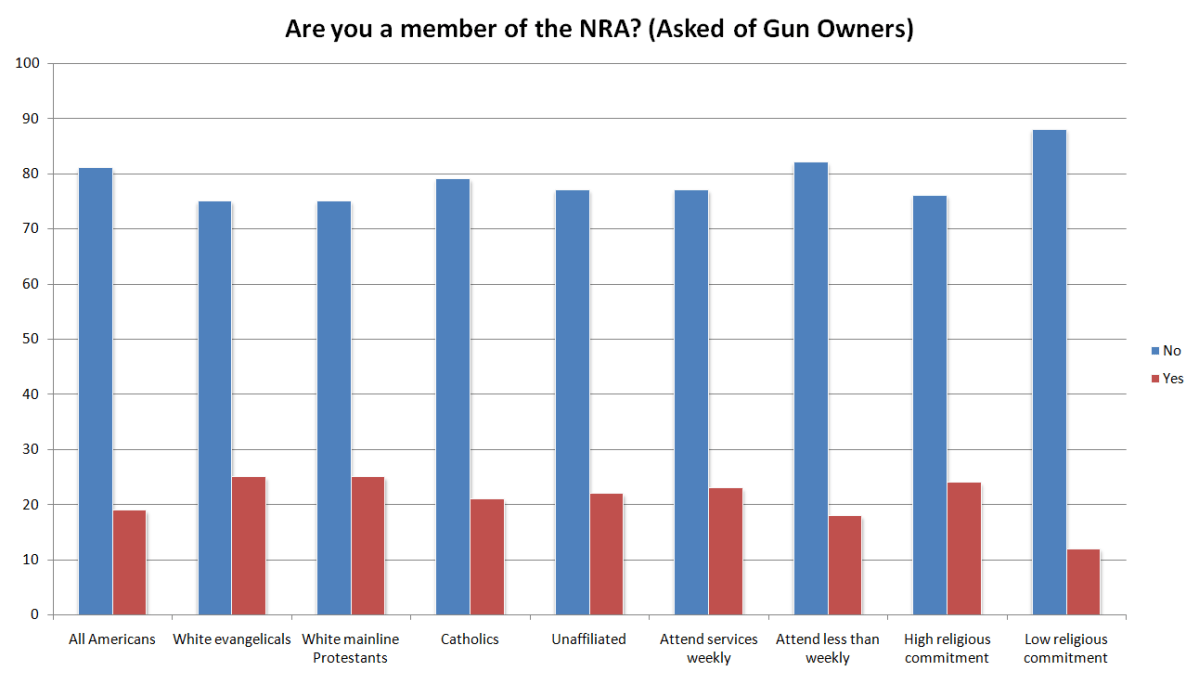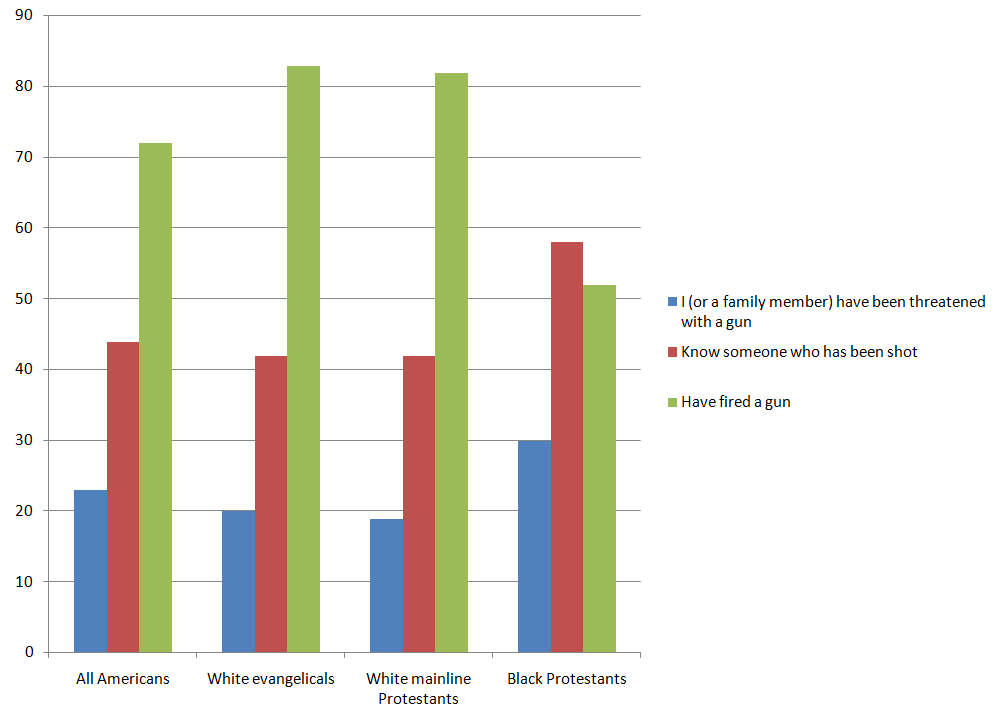One of past President Barack Obama’s most infamous quotes was his 2008 campaign trail comment on small-town citizens that “cling to guns or religion.” New research identifies how many Americans actually favor both.
Two out of five self-identified white evangelicals own a gun, higher than any other religious group, according to a recent study from the Pew Research Center. Four out of five have fired one.
But only a quarter of white evangelical gun owners are members of the National Rifle Association (NRA), and more white evangelicals actually want US gun laws to be more strict than less strict. (A plurality are satisfied with the status quo.)
Pew gave CT a look at the religious breakdowns behind its recent comprehensive report on firearms, which excludes air guns such as paintball, BB, and pellet guns. (Though two-thirds of black Protestants identify as evangelicals, Pew could not break them out on many questions due to small sample size.)
The 41 percent of white evangelicals that own a gun surpasses the 33 percent of white mainliners, the 32 percent of the religiously unaffiliated (or “nones”), the 29 percent of black Protestants (two-thirds of whom identify as evangelical, according to Pew), and the 24 percent of Catholics who own one also. (By comparison, 30 percent of all American adults report owning a gun.)
However, the most faithful aren’t packing the most heat.
Americans who attend religious services weekly were less likely to own a gun than those who attend less frequently (27% vs. 31%). And Americans with a high level of religious commitment were less likely to own a gun than those whose commitment is low (26% vs. 33%).
At the same time, highly religious gun owners are twice as likely to belong to the NRA as less religious gun owners (24% vs. 12%). Gun owners who worship weekly are also more likely to join the NRA (23%) than those who don’t worship as often (18%).
A quarter of gun-owning white evangelicals as well as white mainliners are members of the NRA, more than gun-owning nones (10%), Catholics (21%), or Americans overall (19%).

White evangelicals are also bigger proponents of the gun-rights advocacy group. More than half think the NRA has the right amount of influence (54%), more than all other groups (50% of white mainliners, 42% of Catholics, 40% of all Americans, 34% of nones, and 25% of black Protestants).
Black Protestants (57%) and the unaffiliated (56%) are far more likely to believe the NRA has too much influence, compared to all Americans (44%), Catholics (42%), and white mainliners (34%). White evangelicals trail significantly at 18 percent.
It’s not a surprise, then, that far more white evangelicals (25%) than black Protestants (16%), white mainliners (13%), Catholics (13%), or nones (10%) think the NRA has too little influence.
A quarter of Americans who attend religious services weekly live in a gun-owning household, compared with 29 percent of those who attend less frequently.
The gap between white evangelicals (36%) and black Protestants (23%) and nones (27%) who live in gun-owning households is a lot wider—enough to be statistically significant, Pew researchers concluded. White mainliners, on the other hand, are nearly as likely as white evangelicals to live with someone who owns a gun (35%).
White evangelicals who own a gun say they keep it around for a lot of major reasons: hunting (37%), sport shooting (27%), as part of a collection (11%), or for their jobs (6%). But the major reason cited most often—by majorities of all religious groups—was protection. More than half of white evangelicals (57%) say protection is the single most important reason they own a gun, compared to hunting (21%) or sport shooting (10%) or for their job (1%).
Americans with high levels of religious commitment are more likely than those with low commitment to keep a gun for protection (67% vs. 60%), and less likely to have a gun for sport shooting (26% vs. 36%) or as part of a collection (10% vs. 15%).
A slight majority of Americans who own a handgun carry it with them at least sometimes (57%). White evangelicals are more likely (65%) to do the same: 32 percent carry their handgun with them sometimes; 17 percent carry it most of the time; and 16 percent carry it all the time. Americans with high levels of religious commitment are likewise more likely than those with low commitment to carry a gun with them at least sometimes (65% vs. 58%).
For gun owners, keeping a firearm around makes them feel safer. More than three-quarters of white evangelicals (77%) who own a gun say they feels safer with one in their household than without one, compared to 67 percent of white mainliners, 66 percent of white Catholics, and 60 percent of the unaffiliated. Americans with high levels of religious commitment are more likely to say that having a gun around makes them feel safer (71%) than those with low commitment (61%).
Some of that anxiety stems from past experience. Almost a quarter of Americans (23%) say someone has threatened them or a family member with a gun; the proportion is slightly less for white evangelicals (20%), white mainliners (19%), and white Catholics (18%), and significantly more for black Protestants (30%).
Black Protestants are also much more likely to personally know someone who has been shot, either on purpose or accidentally (58%). By comparison, only 42 percent of white evangelicals, 42 percent of white mainliners, 41 percent of white Catholics, and 45 percent of the unaffiliated say the same. Those with medium levels of religious commitment are more likely to know someone who has been shot (47%) than those with high commitment (40%) or low commitment (37%).
But while white evangelicals are a little less likely than the average American to know a person who has been shot (42% vs. 44%), they’re more likely to have actually shot a gun (83% vs. 72%). Their numbers are similar to white mainliners (82%) and white Catholics (81%), while just 75 percent of the unaffiliated have fired a gun. Meanwhile, black Protestants are significantly less likely to have fired a gun (52%).

Most white evangelicals who have fired a gun did so before they turned 18 (70%). The median age was 14, the same as white mainliners and a year younger than the average American. By the age of 18, many white evangelicals already owned their own firearm (45% of gun owners); the median age for owning a first gun was 18, compared to 20 for the average American.
Those with high levels of religious commitment are less likely to have fired a gun (66%) than those with low commitment (76%). They’re also less likely to have been under 18 when they took that first shot (58% vs. 67%). Their median age for owning a gun was 19, compared to 20 for the less religious.
Those numbers make sense, considering that most white evangelicals (63%) grew up in a household that contained a gun, higher than white mainliners (55%) and significantly higher than the unaffiliated (51%), white Catholics (48%), and black Protestants (40%).
That may be why white evangelicals who have both guns and children under 18 are likely to have talked to their offspring about gun safety (71%, compared to 61% of average Americans with children under 18). In addition, more than 2 out of 5 white evangelicals have taken a gun safety course (44%), significantly higher than white mainliners (34%) and black Protestants (23%), and about the same as white Catholics (44%).
White evangelicals are also more likely to know someone who owns a gun. Three-quarters of white evangelicals (76%) say that some or most of their friends own guns, compared to 59 percent of Americans, 69 percent of white mainliners, 64 percent of white Catholics, and 60 percent of the unaffiliated.

Since white evangelicals are more likely to own and use guns, they are also more likely to feel strongly about the right to bear arms.
While white evangelicals line up with the rest of Americans in naming freedom of speech (92% vs. 93%), the right to vote (94% vs. 90%), and the right to privacy (88% vs. 87%) as essential to their sense of freedom, they’re more likely to also include freedom of religion (94% vs. 86%). And they are much more likely to include the right to own guns (70% vs. 47%).
Half of highly religious Americans say the right to own guns is essential to their sense of freedom, compared with 42 percent of less religious Americans. Predictably, less religious Americans are less likely to say that freedom of religion is essential to them (78% vs. 90%).
White evangelicals are also more likely than the average American to be satisfied with gun laws (44% vs. 30%) or to prefer them to be less strict (23% vs. 18%), while less likely to prefer such laws to be more strict (32% vs. 52%). Slightly more than half of religious Americans (52%) think gun laws should be stricter, as do less religious Americans (58%).
And while relatively few white evangelicals (10%) and Americans overall (8%) say that almost everyone should be able to own a gun, evangelicals are more likely than the average American to say that most people should own one (80% vs. 64%) than should not (9% vs. 19%). They would also prefer gun-carrying to be legal almost everywhere (29% vs. 21%) or in most places in the US (46% vs. 35%), than to have it be off-limits in most places (22% vs. 28%).
Americans who are more religious are also more likely than the less religious to feel that guns should be allowed in most places (38%vs. 29%).
Pew researchers also found:
- 20 percent of white evangelicals often (8%) or sometimes (12%) go hunting, compared to 18 percent of white mainliners, 15 percent of white Catholics, and 14 percent of the unaffiliated.
- 32 percent of white evangelicals often (7%) or sometimes (25%) go shooting or to a gun range, compared with 21 percent of white mainliners, 26 percent of white Catholics, and 24 percent of the unaffiliated.
- White evangelicals prefer handguns. Three in five own (or used to own) a handgun or pistol (62%); fewer have purchased a rifle (55%) or shotgun (48%). While higher, those preferences track roughly with Americans overall: 55 percent have purchased a handgun or pistol, 47 percent a rifle, and 41 percent a shotgun.
- Of the white evangelicals who own guns, about a quarter own just one, while fewer own two (15%), three (11%), or four (8%). Nearly 2 in 5 gun-owning evangelicals have more than five (38%), more than white mainliners (32%) or white Catholics (34%), and far more than the unaffiliated (25%).
- Gun owners who have low levels of religious commitment are more likely to own one gun (35%) than those with high commitment (26%). Those who have higher religious commitment are more likely to own two (24% vs. 18%).
- Gun owners with high levels of religious commitment are less likely to own a rifle (45% vs. 56%) and more likely to own a shotgun (41% vs. 48%) than the less religious.
CT’s previous coverage of guns includes which combination of God and guns produces the fewest suicides.












